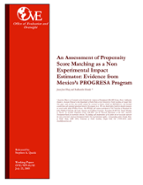An Assessment of Propensity Score Matching as a Non Experimental Impact Estimator: Evidence from Mexico's PROGRESA Program
Date
Jul 2005
In this working paper the authors present evidence on the reliability of propensity score matching to estimate the bias associated with the effect of treatment on the treated, exploiting the availability of experimental data from a Mexican antipoverty program (PROGRESA: Programa de Educación, Salud y Alimentación). The data comes from several outcomes such as food expenditure and child schooling and labor. The methodology compares the results of the experimental impact estimator with those using matched samples drawn from a (non-experimental) national survey carried out to measure household income and expenditures. The results show that simple-cross sectional matching produces significant bias for outcomes measured in different ways. Results are more positive for outcomes measured similarly across survey instruments, but even in this case there are indications of bias depending on sample and matching method.



